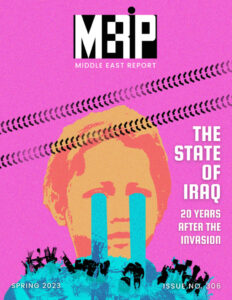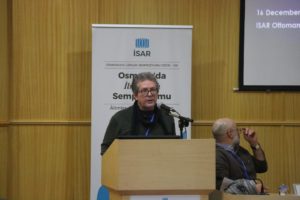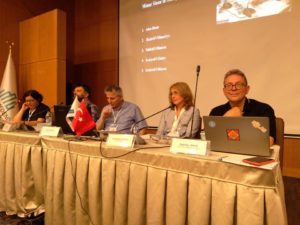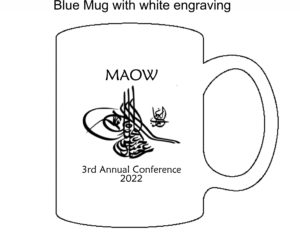
Professor of Middle Eastern History Nabil Al-Tikriti
On 27 March 2024, Professor of Middle East History Dr. Nabil Al-Tikriti joined a panel entitled “The Roots of a Nation to Forced Migration: Contravention of International Law,” jointly organized by Interfaith G-20 and Islamic Relief USA. Panelists included: Cynthia Lange (Senior Counsel, Fragomen), Anna Greene (Senior Protection Officer, UNHCR), Parisa Dada (Program Officer, USRAP Capacity Building Resettlement, Asylum, and Integration, International Rescue Committee), and Alia Boltakke (Founder & Attorney, The Boltakke Law Group).
The panel description:

 In April 2023,
In April 2023, 

 On April 1 and 2, the University of Mary Washington hosted the Third Annual Mid-Atlantic Ottomanist Workshop (MAOW), organized by Professor of Middle East History Nabil Al-Tikriti. Participants were thrilled with the University’s hosting and will remember UMW fondly as they continue their research and careers. The “hybrid” format was a challenge at times (including a Zoom bomber), but the conference featured 23 presenters, four moderators, and roughly 50 individuals who also “zoomed” in remotely from around the world over two days. Presentations came in from throughout the USA, as well as from the UK, Armenia and Turkey. Virginia colleagues from UVA, William & Mary, JMU, Washington & Lee, George Mason and VCU attended, as well as regional colleagues from Salisbury, Wake Forest, SUNY Binghamton, Rutgers University-Newark (remote), Auburn, Florida (remote), Hopkins, Princeton, NYU and Chicago.
On April 1 and 2, the University of Mary Washington hosted the Third Annual Mid-Atlantic Ottomanist Workshop (MAOW), organized by Professor of Middle East History Nabil Al-Tikriti. Participants were thrilled with the University’s hosting and will remember UMW fondly as they continue their research and careers. The “hybrid” format was a challenge at times (including a Zoom bomber), but the conference featured 23 presenters, four moderators, and roughly 50 individuals who also “zoomed” in remotely from around the world over two days. Presentations came in from throughout the USA, as well as from the UK, Armenia and Turkey. Virginia colleagues from UVA, William & Mary, JMU, Washington & Lee, George Mason and VCU attended, as well as regional colleagues from Salisbury, Wake Forest, SUNY Binghamton, Rutgers University-Newark (remote), Auburn, Florida (remote), Hopkins, Princeton, NYU and Chicago.